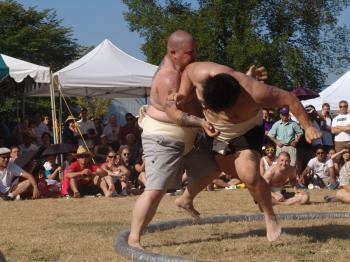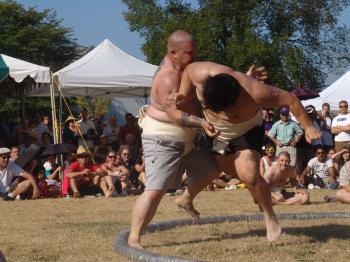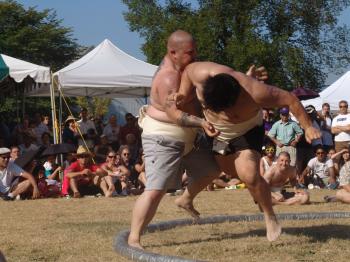Origami cranes hang from trees in Vancouver’s Oppenheimer Park for the annual Powell Street Festival, the largest Japanese festival of its kind in Canada. Now in its 34th year, the festival is a cross-cultural mix of traditional and modern art and music.
The two-day event, held on July 31 and Aug 1, turns the district known as Japantown into an extravaganza of food, music, martial arts, and much more, where elegant kimonos and wooden shoes mix with shorts and sandals.
What was once a small festival with humble roots has become one of the most unique and long- running annual summer events in Vancouver. There is plenty of traditional Japanese fare but the festival has grown to integrate some of Vancouver’s diverse culture into its mix.
“I think one of our main successes is the fact that we’re very inclusive, and while we do celebrate Japanese-Canadian history, arts, and culture, we try to represent it in all its realms. We also open up our doors to everybody,” says festival general manager and programming director Kristen Lambertson.
“We also commission work where we have Japanese-Canadian artists, and often we try to have not only interdisciplinary performances but also cross-cultural exchanges,” she adds.
“For example, this year we commissioned Katari Taiko which is a Japanese Taiko drumming group to create a new body of work with Mario Zetina, who is a Latin percussionist.”
The main stage supports a variety of different acts throughout the two days. Some combine the traditional with the modern, a-la Rhythm Clash—the fusion of traditional Taiko drumming by Total Constructive Interference with the electronica of Chinese-Canadian hip hop group, No Luck Club.
The two-day event, held on July 31 and Aug 1, turns the district known as Japantown into an extravaganza of food, music, martial arts, and much more, where elegant kimonos and wooden shoes mix with shorts and sandals.
What was once a small festival with humble roots has become one of the most unique and long- running annual summer events in Vancouver. There is plenty of traditional Japanese fare but the festival has grown to integrate some of Vancouver’s diverse culture into its mix.
“I think one of our main successes is the fact that we’re very inclusive, and while we do celebrate Japanese-Canadian history, arts, and culture, we try to represent it in all its realms. We also open up our doors to everybody,” says festival general manager and programming director Kristen Lambertson.
“We also commission work where we have Japanese-Canadian artists, and often we try to have not only interdisciplinary performances but also cross-cultural exchanges,” she adds.
“For example, this year we commissioned Katari Taiko which is a Japanese Taiko drumming group to create a new body of work with Mario Zetina, who is a Latin percussionist.”
The main stage supports a variety of different acts throughout the two days. Some combine the traditional with the modern, a-la Rhythm Clash—the fusion of traditional Taiko drumming by Total Constructive Interference with the electronica of Chinese-Canadian hip hop group, No Luck Club.







